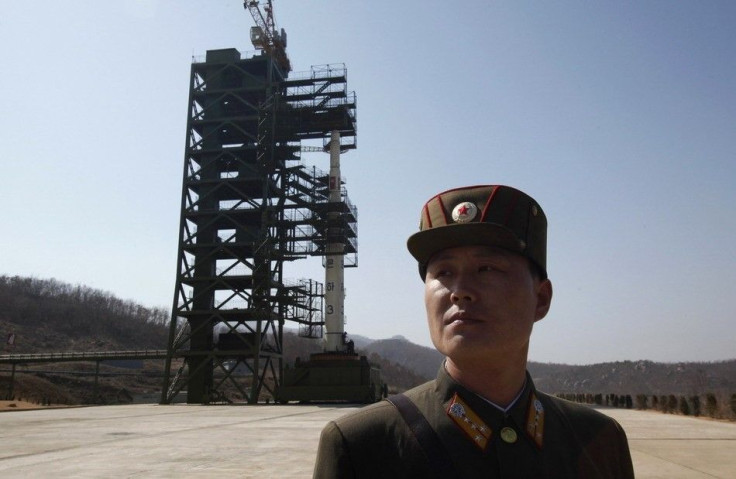Washington Suspends Food Aid After North Korean Rocket Failure

North Korea's failed rocket launch has drawn strong criticism from the United States and its allies, with Washington accusing the Hermit Kingdom of threatening regional security.
The U.S., which had threatened sanctions if the North went ahead with the launch, announced Friday it would suspend a food aid deal with Pyongyang.
The condemnation follows a rare public admission by North Korea, which confirmed its vaunted long-range rocket test was a failure, exploding shortly after liftoff Friday.
The United Nations Security Council will meet to discuss the launch and decide on any further sanctions.
The failure of the satellite and multi-stage rocket, launched to mark the ascendancy of new leader Kim Jong-un and celebrate the 100th birthday of the country's founder, the late Kim Il-sung, sparked fears that isolated North Korea will press ahead with further launches and a third nuclear test to show its military prowess.
The possibility of an additional long-range rocket launch or a nuclear test, as well as a military provocation to strengthen internal solidarity is very high, a senior South Korean defense ministry official told a parliamentary hearing, Reuters reported.
Richard Haass, president of the New York-based Council on Foreign Relations, added that the North's history of unprovoked aggression pointed to some kind of military response.
If history is any guide, this suggests that a test of a nuclear warhead or some sort of aggressive military action -- for example, an artillery strike -- against South Korea could be in the offing. And if this latter scenario occurs, South Korea, unlike on previous occasions, is almost certain to retaliate, said Haass, a former U.S. diplomat.
The rocket was launched from the North's new $400 million launch site near the western border with China, a further sign the impoverished nation may continue to defy United Nations sanctions forbidding rocket launches and nuclear tests.
In a major blow for the fledgling regime of Kim Jong-un, the rocket flew only about 100 kilometers (62 miles) before exploding over the part of the Yellow Sea that separates the Korean peninsula from mainland China. That was far less than the North's 2009 test of a rocket that traveled 3,800 kilometers (2,360 miles).
Tate Nurkin, managing director at defense analyst IHS Jane's, said the failure was a significant blow for Kim Jong-un during a critical time for the young leader. Obviously the rocket launch is pretty embarrassing, Agence France-Presse quoted him as saying. The timing of it is significant. North Korea is all about ceremony and stature and grand, symbolic gestures, and they celebrate the 100th anniversary of the birth of Kim Il-sung.
Nurkin added that, despite Western fears, the North wasn't seeking conflict with its test but merely attention from global leaders. They are seeking attention and the concessions that come with that attention that can help prop up the regime, he said.
The regime told its 23 million people the satellite launch was a failure, in a state television broadcast Friday.
It could be indication of subtle change in the North Korean leadership in how they handle these things, something that may be different from the past, Baek Seung Joo of the Korea Institute of Defense Analyses in Seoul told Reuters.
I mean it would have been unthinkable for them to admit this kind of failure in the past, something that could be seen as an international humiliation. The decision to have come out with the admission had to come from Kim Jong-un.
Immediately after the explosion, South Korea's military dispatched helicopters and ships in an attempt to find debris related to the rocket launch, according to the Yonhap news agency.
North Korea had said the Unha, or Galaxy, rocket would fly south, carrying its Kwangmyongsong-3 communications satellite. The reime insisted the the launch was for peaceful purposes.
South Korea, Japan and the Philippines, the countries nearest the missile's projected trajectory, were on heightened alert in case the launch went awry and endangered their citizens or property, the New York Times reported. Airlines and ships had been ordered to stay away from the rocket's trajectory.
The launch drew international criticism and threats to shoot down the rocket as well as the possibility of ending a food-aid deal with the United States.
United Nations Secretary General Ban Ki-moon had sternly rebuked North Korea for its planned launch.
I only hope that [North Korean] authorities will heed the calls of the international community. It is clearly a violation of Security Council Resolution 1874, Ban was quoted as saying Thursday in Geneva.
It's unclear if the North's rocket was indeed carrying a satellite. U.S. and South Korean officials believe the satellite claim was false and that the firing was to test the rocket's ability to carry a warhead as far as the U.S. West Coast.
© Copyright IBTimes 2024. All rights reserved.





















